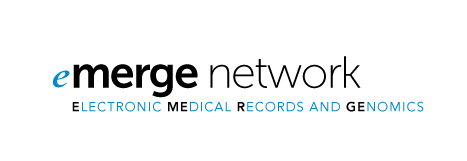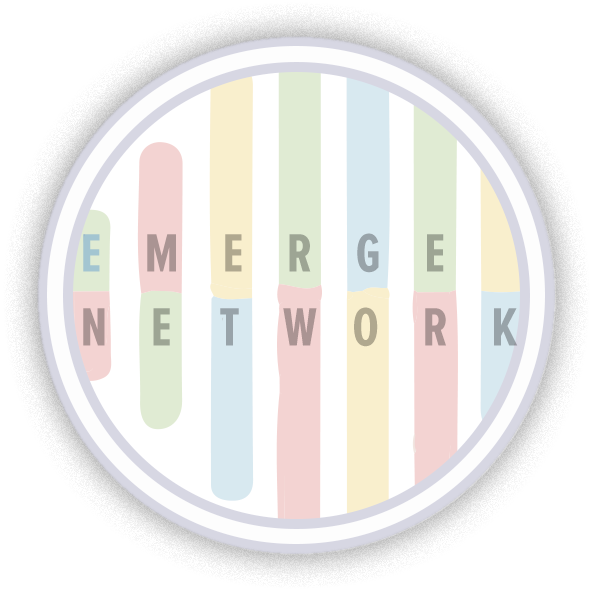
The Network is is focused on genomic medicine discovery and implementation research utilizing large bioreposititories that are linked to electronic health record (EHR) systems. The eMERGE workgroups are organized around the Network’s core focus areas: PRS Validation and Evaluation; Genotyping; Risk Assessment and Return; Recruitment, Retention IRB, & ELSI; EHR Workflow & Infrastructure; Phenotyping; and Provider Uptake and Outcomes.
Each workgroup holds monthly conference calls. Published manuscripts and other notable products from our workgroups can be found on the Publications page.
PRS Validation & Evaluation
Chairpersons: Eimear Kenny (Mt. Sinai) and Patrick Sleiman (Chop);
The eMERGE PRS Validation & Evaluation workgroup will focus on the following areas of research in eMERGE:
- Compile datasets for PRS adjustment to population of interest
- Integration of existing GWAS sets
- PRS (condition) scientific assessment and selection for further evaluation
- PRS reassessment and validation
- Focus on retrospective workflow & data.
- PRS retrospective validation/AnVIL genomic tools
Genotyping
Chairpersons: Meg Roy-Puckelwartz (NU) and Niall Lennon (Broad/CC)
The eMERGE Genotyping workgroup will focus on the following areas of research in eMERGE:
- Genotyping reporting to CC
- Genotyping sign off and approval
- Genotyping validation
- Validate & launch genotyping platform
- Return of calculated PRS (reports) & genotyping data to sites/CC
Comprehensive Risk Assessment & Return
Chairpersons: Gail Jarvik (UW), Iftikhar Kullo (Mayo), and Cindy Prows (CCHMC)
The eMERGE Comprehensive Risk Assessment & Return workgroup will focus on the following areas of research in eMERGE:
- Family History data collection
- GRA clinical data element integration
- GRA development/harmonization
- Confirmatory monogenic risk integration
- Adopting validated PRS into GRA
- Return & management of risk recommendations.
- Return of risk profiles (PRS, mendelian, FH, clinical) & timing
- AnVIL cloud based tools (SMART on FHIR)/AnVIL FHIR to LIMS systems/analysis for GRA
- Return of risk profiles (PRS, mendelian, FH, clinical) & timing
Recruitment, Retention, IRB, & ELSI
Chairpersons: Digna Velez-Edwards (VUMC), Ingrid Holm (BCH), and Wendy Chung (Columbia)
The eMERGE Recruitment, Retention, IRB, & ELSI workgroup will focus on the following areas of research in eMERGE:
- Develop and maintain network wide protocol
- Recruitment & barriers
- Retention strategies
- Participant/provider surveys and engagement
- sIRB protocol development and tracking/iREX
- Education & Ethics/benefits and risk of participation
- Ethics of returning PRS to diverse patients
- ELSI for EHR Integration, IRB, privacy, etc.
- Site ELSI project coordination
- sIRB protocol development and tracking/iREX
EHR Workflow & Infrastructure
Chairpersons: Luke Rasmussen (NU) and Robert Freimuth (Mayo)
The eMERGE EHR Workflow & Infrastructure workgroup will focus on the following areas of research in eMERGE:
- Assemble method to capture outcome data (EHR data and patient questionnaire)
- Clinical data collection/harmonization/R4
- EHR data integration/FHIR
- PRS data integration
- Focus on prospective data workflow
- Security analysis/risk
Phenotyping
Chairpersons: Chunhua Weng (Columbia) and Wei-Qi Wei (VUMC)
The eMERGE Phenotyping workgroup will focus on the following areas of research in eMERGE:
- Capture data across the Network
- Collaborative analysis within and outside the Network
- Phenotypic data refreshes
- Retrospective/AnVIL cloud intergration
- Phenotyping conditions of outcome interest
Provider Uptake & Outcomes
Chairpersons: Noura Abul-Husn (Mt. Sinai); Nita Limdi (UAB)
The eMERGE Provider Uptake & Outcomes workgroup will focus on the following areas of research in eMERGE:
- Establish baseline outcomes for participants
- GRA management recommendations/uptake
- Outcomes & clinical utility capture
- Outcomes & risk reduction analysis
- Control group analysis
- Provider education
- Participant impact/utility – ELSI component

